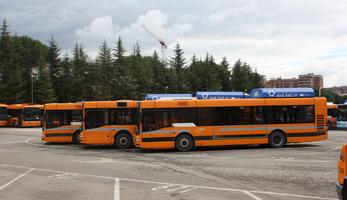Clean fuel technology for the public transport fleet
Summary
16% of buses in the Perugia public transport fleet will be retrofitted with an innovative “dual fuel” solution: Diesel/Methane. It consists of installing plant for the storage of the methane gas (cylinders), the installation of the retrofit equipment and the supply system of the diesel engine.
Implementing sustainable mobility
All the 20 buses have been retrofitted with the dual fuel kit and are in service in the urban public transport service of the city. The Umbria Mobilità drivers and garage officers participated to dedicated training for (i) the installation of the dual fuel kit; and (ii) the correct use of the retrofitted buses. Three kinds of monitoring have been done done: 1) Monitoring of the operating retrofitted buses in terms of driven kms and fuel consumption. 2) Monitoring of the retrofitted buses in terms of maintenance services. 3) Monitoring involving the customers and users of the public transport service which have been recently involved in dedicated focus groups sessions.
Objectives/Innovative asspects od the Measure:
• To introduce clean alternative fuels into the Perugia public transportation fleet; • To achieve a full environmentally sustainable bus fleet in all areas of the city including the Limited Traffic Zone; • To improve regional air quality through the reduction of greenhouse gas emissions; • To enhance customers positive perception and attractiveness of the public transport; • To enhance heritage conservation while improving economic and environmental performances.
Progress
The measure seeks to reduce air pollution, and increase public awareness about the benefits of using alternative fuels. As alternative fuels compete with conventional fuels for a place in public awareness and acceptance, one of their most visible applications is in public transportation. Public transport operations are well suited to alternative fuel use. Transit vehicles often travel on dedicated routes, they are serviced by a team of technicians who can be specially trained for the job, and they are part of fleets that travel across the city; so the economies of scale can be favorable. Environmental and health issues provide powerful arguments to support alternative fuels. Buses powered by natural gas, for example, emit significantly less toxic fumes than those powered by diesel. The measure is part of Umbria Mobilità’s policy to look for ways to make its bus fleet better for customers by introducing environmentally friendly features.
Outcomes
Particulate Matter reduction from 40% up to 80% (with CH4 + POC optional after treatment) - key data checked to access TLZ Smoke reduction up to 50% CO2 reduction up to 14% Noise reduction up to 40% CO emissions reduction to over 90% NOx remains quite unchanged and it is typical of diesel powedered engines due to high compression ratio HC increased as a consequence of the methane combustion. Th evalue is nevertheless under the limits of set by ECE R49 regulation. Fuel cost reduction up to 31% Fuel and maintenance costs reduction up to 21% Diesel fuel reduction up to 55%








